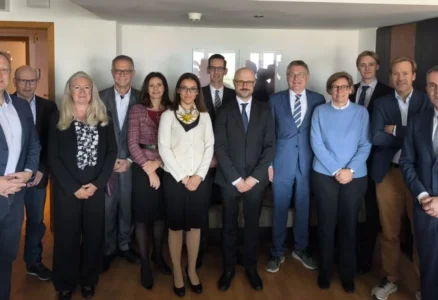WAIFC, DIFC, and Z/Yen spearhead global thinking on the future role of financial centers
- WAIFC produced a whitepaper in partnership with the Dubai International Financial Centre and the Z/Yen Group.
- Financial centers – and the organizations that represent them – are spearheading efforts to strengthen their jurisdictions’ financial markets, business environments, and innovation ecosystems to enable sustainable global growth.
- In 2030, financial centers will be green, smart, innovative, customer-focused, digital, and inclusive, and will play a critical role in attracting and retaining the best talent.
- Continuous collaboration and sharing of knowledge will be key to supporting growth across all sectors in the future.
Brussels, 27.06.2022 – The World Alliance of International Financial Centers (WAIFC), in collaboration with the Dubai International Financial Centre (DIFC) and the Z/Yen Group, today released a white paper focusing on how financial centers around the world are responding to the challenges facing society today and a shared vision for 2030.
Titled, ‘The Future of Financial Centers,’ the white paper was developed following the Annual General Meeting of the WAIFC, where a number of CEO-level representatives from financial centers worldwide gathered in DIFC to share insights on policy design and regulatory interventions to enable sustainable growth, the Fourth Industrial Revolution (4IR) and human capital development.
Whilst focusing on the role financial centers play in supporting global economic growth, offering investment for businesses, providing access to financial services for individuals, and enabling trade, the white paper includes how financial centers:
- operate both through collaboration and competition, offering internationally competitive business environments whilst at the same time partnering with other financial centers to facilitate trade and knowledge transfer.
- are encouraging growth in sustainable finance by developing sustainability strategies, shaping regulation, developing new financial instruments, and contributing to national policy developments.
- have encouraged regulatory change to enable digital finance to help start-ups operate at low cost, support the development of digital ID and Know Your Customer (KYC) systems, and back initiatives to widen access to financial services through mobile platforms.
- are working on attracting, upskilling, retaining, and reskilling talent by establishing tailored training, developing networks that support local workforces, and providing attractive working environments.
- are fostering links between regulators and market participants to ensure that regulatory changes are understood, urging the development of international regulatory standards, providing regulators with commercial insights, and encouraging competition.
The paper further examines the contribution that financial centers can make over the next decade in addressing the challenges relating to sustainability, demography, inclusivity, and 4IR.
Commenting on the white paper, Arif Amiri, CEO of DIFC Authority and WAIFC Board Member, said:
“DIFC and other members of WAIFC understand that the future of business growth and our economies are attached to environmental, social and governance (ESG) principles. Having the knowledge outlined in this report comes with great responsibility. We must now collaborate to turn these observations into deliverables. Our joint activities will be instrumental in supporting the economic recovery from the Covid-19 pandemic, making the transition towards a sustainable financial industry, driving innovation and supporting financial inclusion.”
Jennifer Reynolds, Chair of the World Alliance of International Financial Centers (WAIFC), concluded:
“The global financial industry is amid a dramatic wave of change. It began with the financial crisis in 2008 and has accelerated further with rapid changes in technology, the demand for growth in sustainable finance, and the challenges and opportunities presented by the pandemic. Topics such as Sustainable Finance, Financial Inclusion, Digital Transformation/FinTech, Artificial Intelligence & Big Data and the new world of work, have moved to the centre of global discussions and developments in the industry.”
Professor Michael Mainelli, Chairman at Z/Yen, added:
“While financial centres exist in a competitive system that encourages high performance, that system equally exhibits strong elements of cooperation and collaboration that encourage constant improvement and renewed targeting of society’s deeper needs. It has been a privilege to contribute to setting out a vision for the social and ethical future of financial centers.“
The white paper also highlighted that financial centers should continue collaborating and sharing best practices for supporting growth across all sectors to ensure their ambitions for a better future are realized. Just as clustering financial and professional services in financial centers encourages innovation, the collaboration between financial centers will lead to better sustainable development outcomes.
You can download the white paper here.
The World Alliance of International Financial Centers (WAIFC) is a non-profit association registered in Belgium, representing 19 leading international financial centers on four continents. WAIFC members are government agencies, associations, and similar institutions developing and promoting their financial centers. WAIFC facilitates cooperation between its members, the exchange of best practices, and communication with the general public.
The Dubai International Financial Centre (DIFC) is the leading global financial center in the Middle East, Africa, and South Asia (MEASA) region, which comprises 72 countries with a population of three billion and a GDP of USD 8 trillion. With a 17-year track record of facilitating trade and investment flows across MEASA, the Centre connects these fast-growing markets with the economies of Asia, Europe, and the Americas through Dubai.
Z/Yen is the City of London’s leading commercial think-tank, founded in 1994 to promote societal advance through better finance and technology. Z/Yen has built its practice around a core of high-powered project managers, supported by experienced technical specialists so that clients get the expertise they need, rather than just resources available.



